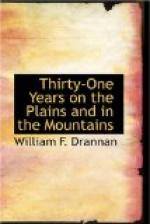Now my task was done. At the risk of my life I had accomplished the desired end, and my reputation as a scout would be established.
I knew the other scouts were having some sport at my expense while I was away, for I had overheard two of them in a conversation that morning make some remarks about Col. Elliott’s tenderfoot scout.
I had said nothing to them, but this made me all the more determined in the undertaking, and now I had turned the joke on them, and, as the old saying goes, “he who laughs last laughs best.”
I could see by the light in the east that the moon would be up in a short time, so I went and got my saddle-horse from where I had tied him, and who, by this time was very thirsty and hungry, as he had had nothing to eat and no water since morning. I watered him, then picketed him out for about two hours on the little meadow, by which time the moon had risen.
I then scalped the five Indians and tied their scalps to my belt. They would be good evidence of my day’s work when I should meet the Colonel at his quarters. This being done, I tied the five Indian horses together and started for headquarters, arriving there about noon the next day.
Just as I had put the horses in the corral and before I had time to dismount, Col. Elliott’s orderly came on the dead run, saying: “Col. Elliott wishes to see you at his quarters at once.”
I turned about and rode over to the Colonel’s tent, and when I had saluted him, he said: “Sir, whose horses are those you just turned into that corral?”
I said: “Sir, those are my horses, as I understand that any stock captured from the Indians by an independent scout, he is entitled to.”
“Mr. Drannan, do you tell me that you captured those horses from an Indian?”
I said: “Col. Elliott, yes, sir; and here is something more I captured with them.” At that I threw down the five scalps at his feet.
He looked amazed as he gazed at the scalps, but said nothing for a few moments.
About this time the orderly announced Jim Beckwith at the door. The Colonel said let him come in, and just as he entered the door, Col. Elliott said:
“Beckwith, where do you suppose this scout got those scalps?”
Jim picked up the scalps, examined them thoroughly, and said: “I’ll bet my black horse that he took them from the heads of five Pah-Ute Indians.”
The Colonel smiled and said: “Drannan, if you will tell us all about the whole affair, I will treat.”
I related the adventure in brief. Dinner being ready, the Colonel set out the whiskey and cigars and told me to call on him that afternoon, as he wished to have a private conversation with me.
I picked up the five scalps and started to dinner, and as I passed by the kitchen I threw them under the negro cook’s feet and told him to cook them for dinner for my friend and me—referring to Jim Beckwith. When he saw the scalps he exclaimed: “Laws a massa, boss! whar you git dem skelps? Marse Meyers said dey wasn’t an Injun in fifty miles o’ hyar.”




